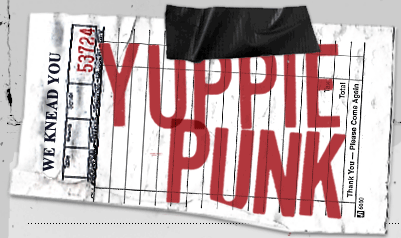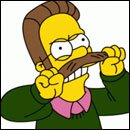Q&A: Frank Turner

is a one man army. Like an old school troubadour, the 27-year-old singer-songwriter has been crisscrossing the globe playing his acoustic punk anthems to appreciative audiences everywhere. And his current string of dates with the Gaslight Anthem, the Loved Ones and Murder by Death is no exception. Though he’s first on the bill, he’s far from a warm-up act. Armed solely with his acoustic guitar, booming voice and low-key demeanor, Turner has been wowing crowds one show at a time.
He first gained attention as the singer for the melodic hardcore band , but since their breakup in 2005, Turner’s been performing as a solo act, releasing a trio of albums, including the excellent “Love, Ire and Song” in 2008 and his recent Epitaph debut, “Poetry of the Deed.” His sound owes a debt to Billy Bragg (though every folk-punk-singing bloke with a British accent sort of does), but there are other influences at work too: The Weakerthans, The Pogues, ’60s American folk and plenty of that ’90s SoCal skate punk sound. We caught up with Turner when he was in Seattle on his latest tour and we tackled a variety of topics including his transition to pop songwriting, punk rock capitalism and the power of social media.
It seems like the kind of music you’re playing wouldn’t have happened six or seven years ago, but with the success of Against Me! and even Dashboard Confessional it seems like there’s more of an audience for this kind of thing now.
You’ve got a point. As far as the UK goes, one could argue Billy Bragg did it, but there wasn’t much of an audience for it when I started doing it in the UK. When my old band broke up, I spent 18 months on the road and on the train just playing to no one.
Were you busking?
No, not busking, just doing bar shows and whatnot. My old band had gotten reasonably successful in the UK so there were people who wanted to see me play on that basis. In terms of there being any kind of a scene to tap into for a punk guy playing an acoustic, there really wasn’t anything like that in the UK at the time. And it was really shit for a long time actually. I don’t want to come across like I’m moaning about it, because I made the choice to do it, but as far as English music goes, I was an anomaly. I’d certainly say I was influenced by Against Me! and all that — they’re a great band. But something I’m quite proud of — as far as the UK goes — is that I created a space for myself musically. I still don’t really get covered by that many magazines in the UK because of shit bloody-mindedness. Coming over here now it’s kind of nice in a way because I’m not sure I could be arsed to do that same rough thing all over again for a country that is much, much bigger. So it’s kind of nice in a way to have something to tap into in terms of a scene. Like everything that Chuck Ragan’s doing — there’s a scene. But again, I slightly rejoice in being an outsider. I never really liked the idea of being 100% a part of a scene. It always seemed like a rubbish idea to like a band because they fit a certain geographical criteria.
Why’d you want to make the change to playing acoustic music?
Because it seemed like the right thing to do. I didn’t grow up with punk music and country music. I got into it comparatively recently — like six or seven years ago. When I was a kid, nearly every night, me and my older sister and my best friends would sit around with acoustic guitars and just sing songs that we liked. We’d play Weezer and Counting Crows and the Levellers. And we also liked NOFX and Propagandhi and shit like that — and to me that was always the center of what I liked about music, just sitting around singing with my friends. It seemed like what I’m doing now would be a good way to do that for a living, but on a grander scale.
 When you were writing songs for your band would you do so on an acoustic guitar? Did the shells of those songs sound anything like your music now?
When you were writing songs for your band would you do so on an acoustic guitar? Did the shells of those songs sound anything like your music now?
Not really. With the old band, I’d write riffs and then we’d string them together in order. Then I’d write the vocals and be kind of deliberately obscurest and weird and over the top. Looking back on it now, I don’t feel like there was any overall sense of songwriting as an object itself. I don’t want to knock my old band, as I think we were good for what we were, but my goal now is to write good songs which is not something I would have said then.
How did you figure out how to write pop songs, or to make your songs more circular instead of angular?
It was with quite a lot of relief that I got to the point of going, “I’m going to write songs that have a verse and a chorus and a middle eight and resolve nicely.” I was listening to stuff like Neil Young and Bruce Springsteen and Johnny Cash and Dylan — all of which was stuff I didn’t grow up with. Being the latecomer I was, I was having an eye-opening experience to the craft of songwriting.
Is one medium better than the other at conveying a message — a hardcore band or an acoustic guitar?
I don’t know. In the hardcore band, I felt that in order to appreciate it, you had to speak that language. You had to be wearing a pair of x-ray specs that would let people see what you were trying to say. My mum is a singer and a musician, but because she doesn’t like music with distorted guitars and screaming, there was no way I could talk to her about what it was that we were trying to do in that band. There was no shared knowledge to communicate with. I’m not saying I sat down to play music to make my mum happy, but one of the things that’s nice about what I do now is that I like the idea of my music being a more universal thing. Its not just angry, suburban kids aged between 16 and 21 with star tattoos on their elbows who are going to like what I do.
Isn’t that in a way who you’re playing for though if you’re touring with punk bands?
In this country, maybe to a degree, although with these shows, Gaslight has a much more diverse following than the average punk band.
Weren’t there also shows with the Offspring?
Again, one of the things about the Offspring is that they’re kind of a heritage band these days. They have an interesting selection of people at those shows. It wasn’t like a Vans Warped Tour thing. In the UK, I’ve toured with folk bands and punk bands and metal bands. I don’t want to disavow punk rock as a scene or anything else — it’s my background — but I don’t want to be stuck for the rest of my life only playing to punk kinds.
How did you hook up with Epitaph?
It was the European office that discovered me. They just came to a few shows and said they really liked it. I was talking to a few other labels at the time. In fact I was pretty far down the road with another label at the time, but I wasn’t very happy with how the deal was panning out. Basically Bret [Gurewitz, owner of Epitaph] called me up and said, “I like your music and I’d like to put it out.” And he asked me what I wanted out of a deal and I told him and he said, “Fine.” It was almost too easy.
I’m guessing you were a fan of the label?
Yeah, definitely. Prior to MySpace and the Internet, if you were into punk rock, there was no way of hearing an album before you bought it. So labels were about quality in a way. I can’t count the number of albums I’ve bought just because it had Epitaph written on the back. And part of me is nostalgic for a time when a label was a mark of quality.
 Speaking of MySpace and the Internet, how do you harness the power of social media to reach people?
Speaking of MySpace and the Internet, how do you harness the power of social media to reach people?
I’m very pro-Internet and Web 2.0. But one of the reasons I’m in favor of it, is that if it’s used well it pulls aside the curtain on the circus that is rock ‘n’ roll, which is something I’m in favor of. I never liked the mythologizing that went on around rock ‘n’ roll. I consider myself an entertainer, but I like the idea of everything being on view for everybody to see. There’s this idea that the magical bus sweeps into town and the aliens get off and play their show and leave again. I never liked that. The Internet is just a cool, fun way to communicate one on one that tries to reduce the barriers between the people who make music and the people who listen to it. That’s one of the things I’ve always liked about punk as a concept — that it said there was no such thing as rock stars. That this idea that people were allowed to act differently because they played guitar for a living is bullshit.
How is it touring just as a solo act? What are the pros and cons of being out by yourself without anybody else to help?
The economics can be easier at times because if I’m doing a solo tour its maybe me or just me and one crew guy. But when I do band shows — the guys who play in my band are good friends of mine — but they are session musicians and the reason I can’t do smaller tours in the USA with them is because I’ve got to pay each one of them each night.
Can one be both a yuppie and a punk?
Yeah, sure, why not. People can be whatever they want. I think underground independent punk rock is a wonderful model of independent capitalists doing their thing in an excellent way. And I’m very pro-capitalism as a system. I’m about as egalitarian as your likely to be in the real world. Something that I take from punk rock is the sort of Henry Rollins self-reliance. Everything that I have, I built on my own. Obviously I have a label working for me, but I reached that point on my own. I’m very proud of my independence as an economic businessman so maybe that makes me a yuppie punk. Yeah, fuck it.
RELATED: Q&A: Davey Von Bohlen of Maritime | Q&A: Jim Lindberg of Pennywise






